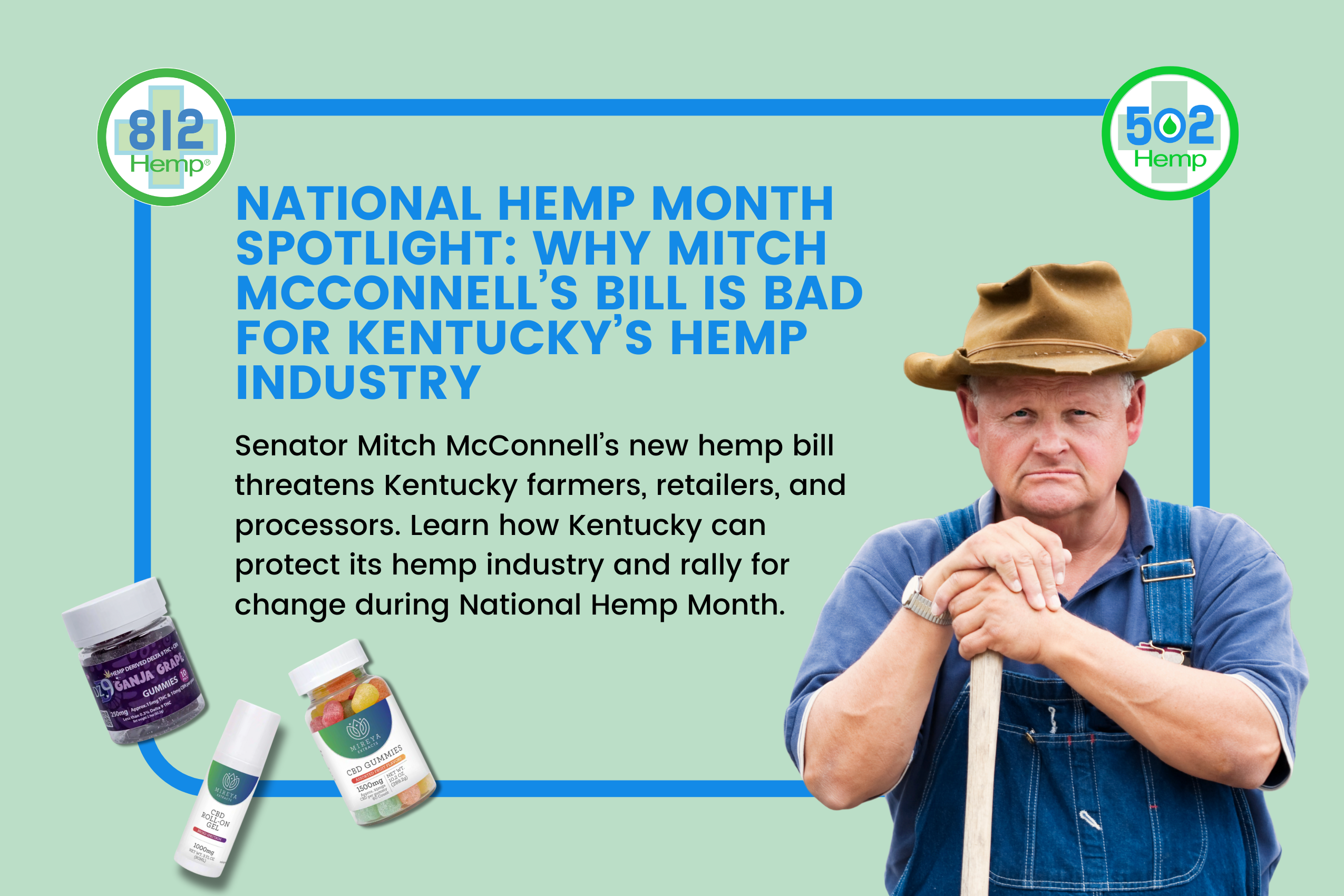July is National Hemp Month—a time to celebrate hemp’s vital contributions to agriculture, industry, and local economies across the United States. Kentucky, in particular, is home to a flourishing hemp industry that supports farmers, retailers, and processors alike. However, a recent federal bill proposed by Senator Mitch McConnell threatens to undermine this burgeoning sector, putting countless livelihoods at risk.
Instead of championing a crop that has historically been a hallmark of Kentucky farming, McConnell’s bill jeopardizes progress, stirring frustration among the state’s hemp advocates. Businesses like 502/812 Hemp are already raising their voices, rallying for the protection and promotion of this versatile crop. Read more about how McConnell can protect kids from THC and grow Krentucky’s hemp industry.
The Rise of Kentucky Hemp
Since the legalization of industrial hemp through the 2018 Farm Bill—legislation in which McConnell himself played a significant role—Kentucky has harnessed the crop’s potential. The state quickly became a leader in the hemp industry, benefiting from its climate, rich soil, and a strong agricultural workforce.
Hemp has proven itself a high-demand crop due to its diverse applications, ranging from textiles and biofuels to nutritional supplements and CBD products. For Kentucky farmers, it provides a sustainable, lucrative alternative to traditional crops like tobacco. Retailers and processors, meanwhile, have thrived as they tap into skyrocketing demand for products that promote wellness and environmental consciousness.
This progress has revitalized rural communities and bolstered local economies. However, the gains Kentucky has made are now standing on shaky ground.
A Federal Bill That Threatens Progress
Senator Mitch McConnell’s proposed legislation has generated waves of concern across Kentucky’s hemp industry. Although McConnell was once a champion for hemp during the 2018 Farm Bill negotiations, this new proposal includes provisions that could suffocate the industry rather than support its growth.
The bill reportedly imposes stricter regulations on hemp-derived products, including new compliance burdens that small-scale farmers, retailers, and processors simply cannot afford. Furthermore, the legislation could limit the production of popular hemp-derived products like CBD oil, creating uncertainty in one of the most profitable sectors of the industry.
Such measures run counter to the ethos of National Hemp Month—a celebration of how far we’ve come with this versatile crop. Instead of supporting the industry’s growth, McConnell’s bill risks shuttering businesses that took bold steps to enter this once-forbidden market.
How Kentucky Farmers and Businesses Are Affected
To fully grasp the potential harm, it’s important to consider how deeply rooted hemp has become in Kentucky’s livelihood. Farmers, many of whom transitioned from tobacco in search of sustainable profitability, invested in hemp with hope for the future. However, adding layers of red tape could drive production costs so high that farmers are forced out of this industry altogether.
For small retailers and processors, the impact may be even more devastating. Many of these businesses operate on slim margins, and any additional financial or regulatory burden could force permanent closures. What’s more, consumers could see reduced access to hemp-derived products they value for health benefits, affecting their quality of life and forcing them to look elsewhere for alternatives.
Kentucky’s hemp farmers and businesses are part of an ecosystem that has the potential to bring immense economic growth and innovation to the state. If that’s dismantled, rebuilding will take years, if not decades.
The Call to Action
This National Hemp Month, it’s critical to spotlight the efforts of advocates fighting to keep the hemp industry alive and thriving in Kentucky. Organizations like 502/812 Hemp are leading grassroots campaigns to educate the public, influence policymakers, and defend Kentucky’s hemp farmers and businesses.
502/812 Hemp represents everything that makes hemp a valuable crop and industry. From promoting sustainability to supporting local communities with jobs and resources, their work demonstrates the broader benefits of cultivating hemp.
However, advocacy alone isn’t enough. Farmers, processors, and retailers need lawmakers to advocate for policies that protect and promote the industry. McConnell and other policymakers should focus on enabling the industry to thrive, rather than stifling it with cumbersome measures.
Why Supporting Hemp is Better for Kentucky
Hemp isn’t just a crop; it’s an economic and cultural opportunity. By investing in the industry rather than constraining it, Kentucky could solidify its status as a national leader in hemp production. Here’s why:
Economic Growth
Hemp is a profitable crop that fuels local development. Every level of the industry—from farming to processing to retail—creates jobs and stimulates economic growth.
Sustainability
Hemp is considered one of the most environmentally friendly crops, requiring less water and fewer pesticides than many alternatives. Supporting hemp aligns with efforts to promote sustainable agriculture in Kentucky.
Market Demand
The demand for hemp-derived products, especially CBD oils, is growing exponentially. By expanding production, Kentucky can meet growing market needs rather than ceding ground to competitors in other states.
Legacy and Innovation
Kentucky’s history with hemp is long and distinguished, dating back to colonial times. By fostering innovation in hemp products and applications, Kentucky can reclaim its position as a leader of the hemp revolution.
Moving Forward
There’s no better time than National Hemp Month to reassess Kentucky’s approach to this vital industry. Senator Mitch McConnell has an opportunity to reverse course, withdraw harmful proposals, and instead champion legislation that supports farmers, retailers, processors, and consumers alike.
Kentucky’s hemp industry isn’t just a local issue—it’s part of a larger national movement toward sustainable agriculture and economic innovation. Businesses like 502/812 Hemp serve as a beacon of what’s possible when communities rally behind this remarkable crop.
McConnell and other lawmakers should take inspiration from these efforts and work to strengthen—not weaken—the hemp industry. Kentucky’s future depends on it.
If you’re ready to give CBD a try, visit 502 Hemp to discover high-quality, lab-verified options made with care and integrity. Your path to calm might be closer than you think. Start exploring today—your mind and body will thank you.
*The statements made regarding these products have not been evaluated by the Food and Drug Administration. The efficacy of these products has not been confirmed by FDA-approved research. These products are not intended to diagnose, treat, cure or prevent any disease. All information presented here is not meant as a substitute for or alternative to information from healthcare practitioners. Please consult your healthcare professional about potential interactions or other possible complications before using any product. The Federal Food, Drug, and Cosmetic Act requires this notice.



